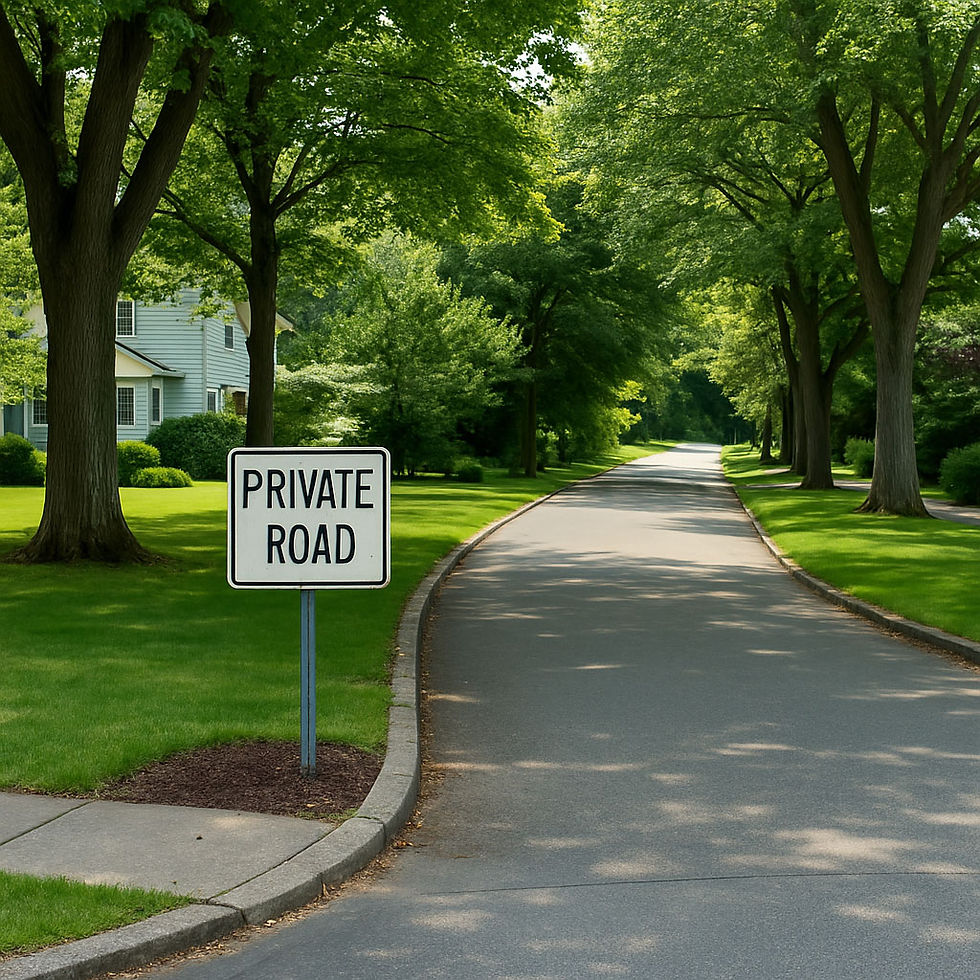The Hidden Risks of Shared Driveways and Private Roads
- Taub and Bogaty
- Aug 1, 2025
- 3 min read

Shared driveways and private roads are more common than many Long Island buyers realize, especially in older neighborhoods and coastal communities. These arrangements may seem straightforward at first, but they often come with legal and practical complications that can affect property value, access, and the ability to sell.
What Is a Shared Driveway or Private Road?
A shared driveway is a single driveway used by two or more property owners, often located on or crossing a property line. A private road is a road that provides access to homes but isn’t maintained by the local town or municipality.
While these setups are legal, issues arise when the responsibilities and rights aren’t clearly defined. Buyers should carefully review how access is granted, who is responsible for upkeep, and whether these details are appropriately documented in legal records.
Title and Ownership Issues
Who Owns What?
It’s easy to assume that a shared driveway is jointly owned, but that’s not always the case. Often, the driveway is located entirely on one homeowner’s land, with the neighbor only having the legal right to use it. Similarly, private roads may be owned by one or more residents or fall under the oversight of a homeowners’ association, if one even exists.
Without a properly recorded easement, future conflicts over usage can become challenging to resolve. A comprehensive title search should verify the existence of any easements or right-of-way agreements.
Gaps in the Chain of Title
In some older Long Island neighborhoods, particularly those with homes passed down through generations, informal access agreements may never have been documented. When these verbal arrangements aren’t recorded in public records, buyers can be left without legal recourse if disputes arise with neighbors.
Maintenance Responsibilities
Who Pays for Repairs?
Upkeep isn’t just cosmetic—it’s necessary. Snow removal, pothole patching, and resurfacing all come with costs, and disagreements about who pays can lead to friction.
Without a written maintenance agreement, one homeowner might end up covering everything, or worse, critical repairs may never get done. A strong maintenance agreement clearly outlines who pays what and how responsibilities are divided.
What Happens When Neighbors Disagree?
Disputes over costs, usage, or repairs can quickly escalate into personal matters. If there’s no written agreement, enforcement is limited, and civil litigation may be the only solution. Unfortunately, legal battles are costly, slow, and can sour relationships with neighbors.
Impacts on Lending and Resale
Mortgage Approval Issues
Lenders seek clear and reliable access to any property being financed. If a shared driveway or private road lacks a legal easement or formal maintenance plan, loan approval may be delayed or denied entirely.
This is particularly true for government-backed loans, such as FHA or VA, which have strict requirements around property access, safety, and documentation.
Resale Value Concerns
A buyer may accept shared access, but the next one might not. Properties without recorded easements or agreements can linger on the market, sell for less, or require legal cleanup before being listed for sale.
Common Long Island Scenarios
North Shore estates with winding driveways that serve multiple homes on a single access path
South Shore bayfront homes are connected by private lanes, often maintained by loosely defined neighbor arrangements.
Historic villages and hamlets where homes predate zoning regulations and share driveways without formal records
Each of these scenarios illustrates how undocumented or poorly managed access can lead to complications during a sale.
Avoiding Surprises at the Closing Table
That beautiful home tucked away from the street or near the water can lose its appeal if unresolved access issues come to light at closing. Buyers should:
Confirm that easements or right-of-way agreements are recorded and enforceable
Request or draft an explicit maintenance agreement
Understand who owns the access route and what that means legally
Make sure the lender is satisfied with the arrangement
For sellers, addressing these details early improves transparency and reduces the chance of a deal falling through.
When it comes to shared driveways or private roads on Long Island, early planning and legal clarity go a long way in ensuring a smooth process. Contact Taub & Bogaty at (516) 531-2500 or visit https://www.realestatelawny.com/contact to ensure your transaction proceeds smoothly without avoidable roadblocks.




Comments